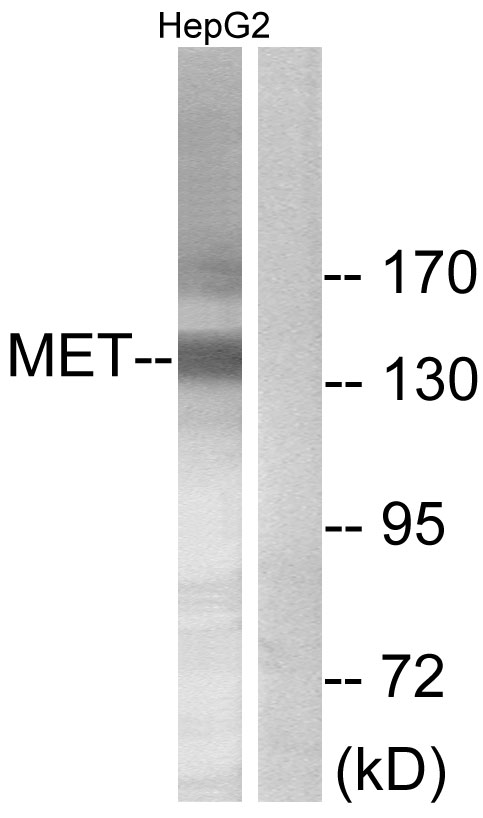![Untreated (–) and treated (+) HeLa whole cell extracts (30 μg) were separated by 5% SDS-PAGE, and the membrane was blotted with c-Met (phospho Tyr1234) antibody [HL2907] (GTX640244) diluted at 1:1000. The HRP-conjugated anti-rabbit IgG antibody (GTX213110-01) was used to detect the primary antibody, and the signal was developed with Trident ECL plus-Enhanced. Untreated (–) and treated (+) HeLa whole cell extracts (30 μg) were separated by 5% SDS-PAGE, and the membrane was blotted with c-Met (phospho Tyr1234) antibody [HL2907] (GTX640244) diluted at 1:1000. The HRP-conjugated anti-rabbit IgG antibody (GTX213110-01) was used to detect the primary antibody, and the signal was developed with Trident ECL plus-Enhanced.](https://www.genetex.com/upload/website/prouct_img/normal/GTX640244/GTX640244_45439_20240614_WB_treatment_HGF_24061802_341.webp)
Untreated (–) and treated (+) HeLa whole cell extracts (30 μg) were separated by 5% SDS-PAGE, and the membrane was blotted with c-Met (phospho Tyr1234) antibody [HL2907] (GTX640244) diluted at 1:1000. The HRP-conjugated anti-rabbit IgG antibody (GTX213110-01) was used to detect the primary antibody, and the signal was developed with Trident ECL plus-Enhanced.
c-Met (phospho Tyr1234) antibody [HL2907]
GTX640244
ApplicationsWestern Blot
Product group Antibodies
ReactivityHuman
TargetMET
Overview
- SupplierGeneTex
- Product Namec-Met (phospho Tyr1234) antibody [HL2907]
- Delivery Days Customer7
- Application Supplier NoteWB: 1:500-1:3000. *Optimal dilutions/concentrations should be determined by the researcher.Not tested in other applications.
- ApplicationsWestern Blot
- CertificationResearch Use Only
- ClonalityMonoclonal
- Clone IDHL2907
- Concentration1 mg/ml
- ConjugateUnconjugated
- Gene ID4233
- Target nameMET
- Target descriptionMET proto-oncogene, receptor tyrosine kinase
- Target synonymsAUTS9, DA11, DFNB97, HGFR, RCCP2, c-Met, hepatocyte growth factor receptor, HGF receptor, HGF/SF receptor, SF receptor, proto-oncogene c-Met, scatter factor receptor, tyrosine-protein kinase Met
- HostRabbit
- IsotypeIgG
- Protein IDP08581
- Protein NameHepatocyte growth factor receptor
- Scientific DescriptionThis gene encodes a member of the receptor tyrosine kinase family of proteins and the product of the proto-oncogene MET. The encoded preproprotein is proteolytically processed to generate alpha and beta subunits that are linked via disulfide bonds to form the mature receptor. Further processing of the beta subunit results in the formation of the M10 peptide, which has been shown to reduce lung fibrosis. Binding of its ligand, hepatocyte growth factor, induces dimerization and activation of the receptor, which plays a role in cellular survival, embryogenesis, and cellular migration and invasion. Mutations in this gene are associated with papillary renal cell carcinoma, hepatocellular carcinoma, and various head and neck cancers. Amplification and overexpression of this gene are also associated with multiple human cancers. [provided by RefSeq, May 2016]
- ReactivityHuman
- Storage Instruction-20°C or -80°C,2°C to 8°C
- UNSPSC12352203

![Specificity test was performed by coating the plate with MET peptide, MET (phospho Tyr1234) peptide, MET (phospho Tyr1235) peptide, and MET (phospho Tyr1234/Tyr1235) peptide (15.63 ng/mL). Coated peptides were probed with c-Met (phospho Tyr1234) antibody [HL2907] (GTX640244) (1 μg/mL). Goat anti-rabbit IgG antibody (HRP) (GTX213110-01) (1:10000) was used to detect the bound primary antibody. Specificity test was performed by coating the plate with MET peptide, MET (phospho Tyr1234) peptide, MET (phospho Tyr1235) peptide, and MET (phospho Tyr1234/Tyr1235) peptide (15.63 ng/mL). Coated peptides were probed with c-Met (phospho Tyr1234) antibody [HL2907] (GTX640244) (1 μg/mL). Goat anti-rabbit IgG antibody (HRP) (GTX213110-01) (1:10000) was used to detect the bound primary antibody.](https://www.genetex.com/upload/website/prouct_img/normal/GTX640244/GTX640244_45439_20241122_ELISA_Indirect_Multiple_Bar_Specificity_24120522_863.webp)






